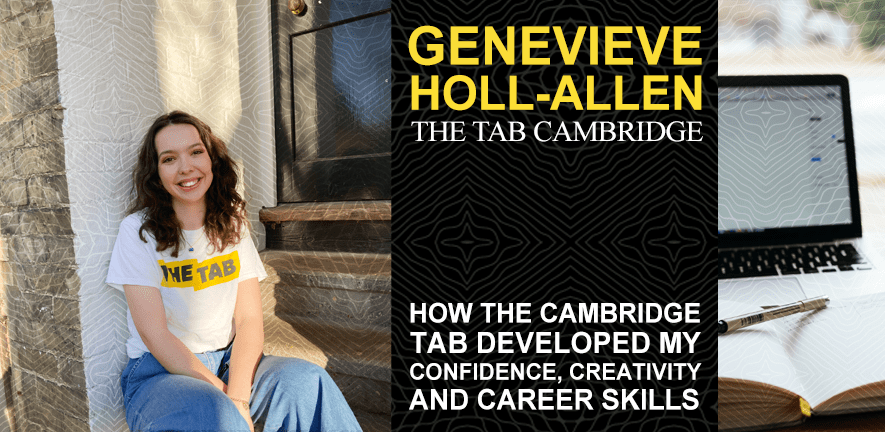Genevieve Holl-Allen, previous Editor-in-Chief at the Cambridge Tab, shares what it’s like to work for the largest student news outlet in the UK and the experience and skills you gain in the team
In March 2020, I flew home from my Year Abroad which had been cut short by the pandemic. Faced with the prospect of several months at home, I was already at a loose end. During my first week back, a post popped up on Facebook to say that the Cambridge Tab was looking for new writers for Easter term. It was an exciting creative opportunity, and a means to shine a light on how students were faring during the pandemic.
Some four months after I first joined the Tab, I became Editor-in-Chief alongside Izzy Dignum. The skills, confidence, and connections I have gained as a result have made it one of the best experiences of my university career, and have made me determined to pursue journalism after graduation.
About the Cambridge Tab
The Cambridge Tab is part of a national network of student-run news outlets based at universities up and down the country. It’s an online publication, covering news, opinion, features, lifestyle, theatre, the famous Tab quizzes – you know you’ve done one! – and ‘trash’.
There are 31 Tab teams (with around 500 journalists) at UK universities. As the Tab is not associated with any single university, journalists can use the platform to hold their higher education institutions to account. The Tab website, with a homepage which compiles the best and most relevant articles, allows for your articles to be read across the country, and for some stories to hit the national headlines. The Cambridge Tab usually has around forty student writers per term, with a team of five senior editors and two Editors-in-Chief.
You get the creative freedom to cover topics that you think are important.
I started off as an Opinions writer in March 2020, but had the chance to write articles across most sections. I became particularly interested in interviews, especially those which I conducted with the student body: I spoke to May Ball presidents who had their events cancelled, and the graduating cohort of 2020.
As Editor-in-Chief, in addition to writing articles, we edited articles produced by other writers, organised meetings and (virtual) socials, provided basic training on what we had already learnt whilst writing for the Tab ourselves (for example, how to find news stories or formulate Freedom of Information requests), and produced commissions lists. During this time, I was able to commission articles on access, an anonymous piece written by a transgender student, and to cover the rent strike. It was a privilege to be able to use the Cambridge Tab platform to share a variety of student experiences, which it will continue to do this term and beyond.
One of the highlights of my experience at the Cambridge Tab was the community. We would have weekly Zoom meetings to discuss potential stories with each other, and often had the chance to collaborate on articles with other writers. I got to know many students from different years and colleges, and was hugely influenced by other talented students’ styles and ideas.
You develop a skill set vital for a career in journalism, whilst delving into student life and reporting on what is important to you, your friends and your peers.
Another highlight for me was to see one of my stories published in the national newspapers. My coverage of the removal of a window dedicated to Ronald Fisher at Gonville & Caius College was featured in the national press. Buying a copy of The Times in the supermarket the morning the article was published was very exciting. I realised then that student media could really act as a springboard for a career in journalism, and I had officially caught the journalism bug!
The practical skills of writing an article, devising headlines, editing, sourcing images, and developing a nose for a potential story are essential for a journalist. You develop a skill set vital for a career in journalism whilst reporting on what is important to you, your friends and your peers. The assistance that you receive from the journalists at the London HQ means that you can realise ambitious article ideas, and receive support and legal guidance too.
The confidence I have gained from getting work published, with the help of such a supportive student writing community, has led to me writing for national papers. A portfolio of articles already online on a platform like the Tab is a significant benefit when trying to pitch to other publications. My experience in student journalism has also led me to pursue other forms of news media, such as documentary-making.
The organisational, writing, and interpersonal skills you gain are transferable to any career.
I cannot recommend highly enough that anyone with an interest in current affairs and writing – no matter how inexperienced you are – tries out student media. Even if you don’t end up pursuing journalism after graduation, the organisational and interpersonal skills you gain are transferable to any career.
Besides, you will be the first in your friendship group to find out about the big stories at the University. Or you might be the person who creates a quiz that gets everyone tagging their friends on Facebook, and that is pretty great fun in itself.

